“Best Reason to Buy the Sun,” The Benevento / Russo Duo
Play Pause Stop, 2006
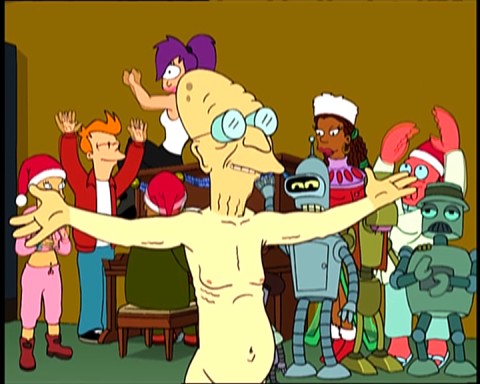
Merry Christmas, everyone! I just wanted to take a moment to thank all of my friends, collaborators and readers for your help and contributions during my 12 Days of Christmas feature.
I was a bit nervous about it since 12 articles spanning multiple collaborators was a daunting prospect, but not only did everyone deliver as promised, but the writing was fantastic and the episode selections were wonderful. Thanks to everyone who wrote or read anything…I genuinely appreciate it, and I thank you so much for helping me to make this the blog that it is.
The feature ended yesterday because…well, I figured nobody in their right minds would bother to visit Noiseless Chatter on Christmas. (There’s a lot of porn you should be watching instead. And family time, I guess.)
But just in case you’re here, I’d like to offer a sincere and warm thanks for being such a great audience. Here’s to lots more growth in the new year.
And in case you missed it, or would just like to relive some of the great submissions, here’s the 12 Days of Christmas in its entirety:
Day 1: “A Christmassy Ted,” Father Ted, by David Black
Day 2: “Simpsons Roasting on an Open Fire,” The Simpsons, by Zach Kaplan
Day 3: “Christmas Special” Pt. 1 and 2, The Office, by Ben Gallivan
Day 4: “Rapture’s Delight,” American Dad!, by me
Day 5: “The Strike,” Seinfeld, by Ryan
Day 6: “The Constant,” LOST, by Jacob Crites
Day 7: “Don’t Bring Your Guns to Town, Santa,” The Partridge Family, by Jeff Zoerner
Day 8: “Christmas Special,” The League of Gentlemen, by David Black
Day 9: “Pee-wee’s Playhouse Christmas Special,” Pee-wee’s Playhouse, by me
Day 10: “Jazz Records,” Everybody Loves Raymond, by Ryan
Day 11: How the Grinch Stole Christmas!, by Zach Kaplan
Day 12: “Blackadder’s Christmas Carol,” Blackadder, by Ben Gallivan
Thanks again to everyone for your support over the past year. See you in 2013!
On the twelfth day of Christmas, Ben Gallivan gave to us…
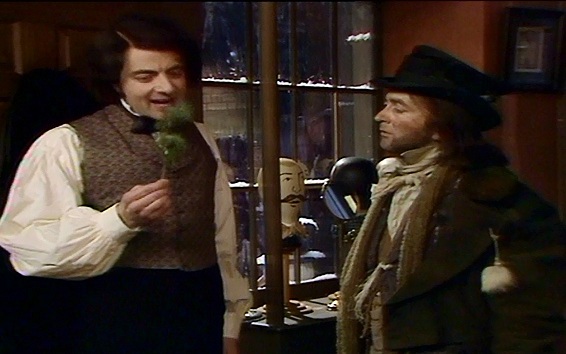
“Humbug!…Humbug!!! Humbug, Mr Baldrick?”
Do Americans have mint humbugs? Do they sell them at confectioners in outdated imperial measures like they do here in the UK? Well, let it be known that I visited my local confectioners here in sunny Cardiff, UK earlier today and was charged a frankly extortionate £2.23 (around $3.60) for a tiny bag of them. No wonder Ebeneezer Blackadder is pissed (off).
Anyway, to business. Blackadder and his compadres are something of legend in these parts. For the last 30 years, Mr E. Blackadder, Mr S. Baldrick and the other characters whose names and titles change with every series have become somewhat of a national treasure and with good reason. “Blackadder’s Christmas Carol” was set in between the Georgian era – that of Blackadder The Third and that of The Great War which featured in the never bettered Blackadder Goes Forth, planting us well and truly in the middle of the Victorian era.
Even if you don’t know the episode, the title alone should give you some idea of what to expect. Lifting as lightly as possible from the storyline of Charles Dickens’ A Christmas Carol, we are thrust into the late 1800s to find Blackadder and his faithful (although we know not why) servant Baldrick, running a ‘moustache shop’ in London. As an aside, it’s worth looking through the cast list to discover many of the great comic actors of the day taking part in this yuletide comedy-fest. Not only do we have the obvious talents of Messrs Atkinson and Robinson, but regulars such as Stephen Fry and a very pre-House Hugh Laurie also show their faces along with Miriam Margolyes, Jim Broadbent and Miranda Richardson. Hollywood would be bursting at the seams to get that bunch on board, you can be sure.
I am not particularly au fait with any Dickens tome; there may be parts of this little essay where you want to shout and scream at your little laptop screen at inaccuracies and wish to render me immobile, but the fact is, I was brought up in the 1980s and not the 1880s so most of my knowledge of history comes from the pen of Richard Curtis and Ben Elton.
Throughout the Blackadder series, the title character has always been the cunning, sarcastic one but in the first scene of the Christmas Carol episode, he is in a rather jaunty mood; something that has very rarely been seen before or since. Described as “the nicest man in England,” even the studio audience seem little at ease with this different persona. He is in fact, pretty much how we find Mr Scrooge at the end of the Dickens classic – even at the age of 10 when I first saw this, you could kind of see what was coming.
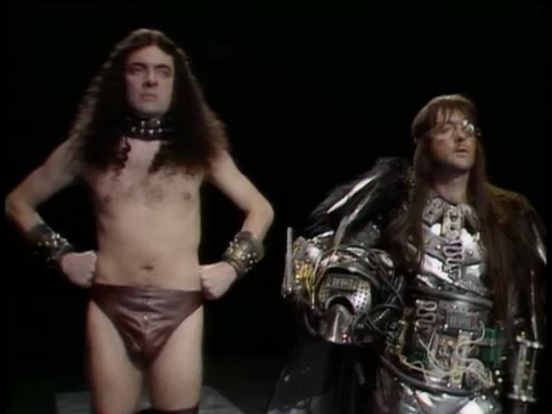
Despite this, one actually feels sadness for him; his over-generosity to anyone means that visitors to his shop are pretty much guaranteed a favour or an extra piece of the pie rendering Blackadder himself lonely, sad and completely broke. Despite the jollity, he still does get the brutal digs in every now and again.
Mrs. Scratchit: [crying] No goose for Tiny Tom this year.
Blackadder: Mrs. Scratchit, Tiny Tom is fifteen stone and built like a brick privy. If he eats anymore heartily, he will turn into a pie shop.
Plus of course the lewd comments, undoubtedly supplied by Mr Elton, given that it was all he could write. A touch of the Carry On… series infiltrating some otherwise excellent comedy writing.
[Blackadder holds up a small pine twig which acts as their Christmas tree]
Baldrick: It’s a bit of a tiddler ain’t it?
Blackadder: Yes but size isn’t important my friend. It’s not what you’ve got, it’s where you stick it!
The most memorable scenes are of course the writers’ take on the ghosts of Christmas past, present and future. They take shape as one entity – the Spirit of Christmas played by Robbie Coltrane. If the casting agent didn’t get a huge slap on the back for choosing him, then I’d happily go to his house to do that right now. His initial reason for visiting before going off for more hauntings and a “scare the bugger to death” was to congratulate Blackadder on his virtuous and philanthropic ways but instead his visit takes a turn.
Whilst showing him visions of his ancestry – all of which behave like bounders and cads – Blackadder becomes more intrigued than appalled and seemingly wants to be more like them, much to the worry of the Spirit of Christmas. Insistent on knowing how things would turn out in the future, we are transported into an unknown era (but let’s face it kids, those are some dated futuristic costumes and graphics, huh? – Space 1999 was more accurate) where Blackadder is Grand Admiral of the Universe or somesuch and Baldrick his weedy slave, dressed only in a leather posing pouch.
The only sight worse than Baldrick as a weedy slave dressed only in a leather posing pouch, is Blackadder himself dressed the same way. And this, we discover is how things turn out if he continues with his kind ways, prompting the revelation that “Bad guys have all the fun.” Problem solved, we’re back to Blackadder the Bastard in around 25 minutes – thank heavens for that.
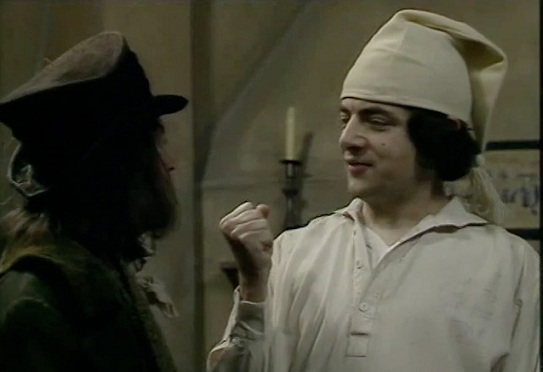
After punching Baldrick and generally being a swine, he insults the infuriating Mrs. Scratchit with the line of the episode:
Mrs. Scratchit: Ah, Mr. Ebenezer! I was wondering if you had perhaps a little present for me…? Or had found me a little fowl for Tiny Tom’s Christmas…?
Ebenezer Blackadder: I’ve always found you “foul,” Mrs. Scratchit – and more than a little!
If there’s one thing that us Brits do well, it’s the twist in the tale. This one of course being Blackadder faltering somewhat in his reception of the Queen (aka winner of the Round Britain Shortest Fattest Dumpiest Woman Competition) and Prince Albert (the victor of this year’s Stupidest Accent Award) who have come to reward him for his philanthropy by giving him fifty grand and a title. “Empress Oink” leaves very shortly after leaving Blackadder to rue his mistake of mistaken identity when Baldrick presents him with the Royal seal.
“Blackadder’s Christmas Carol” crams a lot into its 42 minutes and could quite easily been written as a feature length in itself. Cast members are thrust in and out of scenes a tad too quickly and a little more time and effort would have made this unbeatable.
But please…any budding set designers out there should take heed of the “future vision” scenes and whatever you do, try not to replicate them in any way. I know it’s a comedy, but sheesh!
Merry Christmas, everybody and if you have the odd bottle of Nurse McCready’s Surgical Bruise Lotion lying around, then you can join me in a toast to the super 2013 that’s just around the corner.
Nadolig Llawen.
Tomorrow: It’s Christmas! Get off the internet.
On the eleventh day of Christmas, Zach Kaplan gave to us…
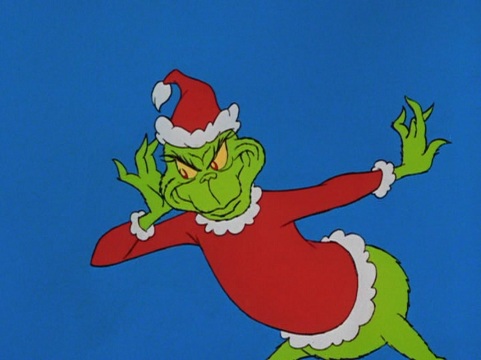
Every nerd has something they collect. Some try to track down every issue of their favorite comic book, some relish rare video games, and others are simply satisfied with collecting themselves after a brutal de-pantsing. I collected the work of Dr. Seuss.
Growing up, my bookshelves were filled with all number of works by Seuss, both under his usual monicker and pseudonyms Theo LeSieg and Rosetta Stone. I had rare books like his risqué adult novel The Seven Lady Godivas, collections of his World War II-era comics and advertisements and a copy of his terrible movie, The 500 Fingers of Dr. T. My father would back-order out-of-print works for me, and my favorite place to visit was the book store. So, needless to say, How the Grinch Stole Christmas! was the only special that fully suited my youthful Christmas needs.
Like most of Seuss’s books, How the Grinch Stole Christmas! outlined an important message: Christmas doesn’t come from a store; it comes from the warm feelings of those we care about, and a sense of fun and togetherness. Christmas day is in our grasp, as long as we have hands to clasp (sorry, stump-o’s).
On its surface, it’s a sentiment that doesn’t look like much. Of course, with the wonderful rhyming patterns, made-up words like “chimbley” and winning illustrations, it wasn’t hard to make the message a more appealing one. But as a Seuss-o-phile, this resonated to me on a different level. Seuss’s stories were generally allegories for big, important things – Yertle the Turtle is Napoleon or Hitler, Horton Hears a Who is about the bombing and occupation of Japan (and dedicated to “My Great Friend, Mitsugi Nakamura of Kyoto, Japan”), The Butter Battle Book is about the Cold War. Why place the meaning of Christmas alongside such incisive analyses?
Religiously, I grew up in a household that none of my largely Christian schoolmates could fathom without a few questions. My mother was raised Episcopalian, but I don’t remember her ever being religious. My father is Jewish, but again, not very religious besides observing the high holy days and Hanukkah – though even the former practice began in my adolescence. Every year, we celebrated both Hanukkah and Christmas. I have fond memories of decorating our Christmas tree and lighting our menorah, illuminated as it was by an array of Christmas lights.
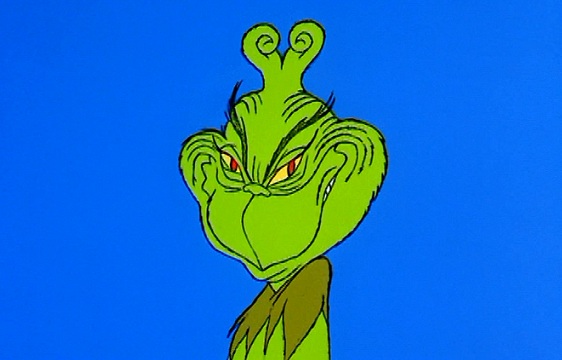
I called myself a “reform Jew”, but I think all along I knew I was atheist. No matter how hard I tried to convince myself, I did not believe in God. Even without going to church every Sunday, God was assumed to exist by everyone around me – and, thus, that I believed as well. I sat by while friends called other friends “stupid” for not believing in Him before I was out of the atheist closet myself.
I was surrounded by Christianity in my suburban Texas town. Churches were everywhere. A girl that I liked was baffled by my disbelief in the miracles of Jesus. I uncomfortably sat through an assembly that was described as a talent show for teachers, where one instructor gave a brief but passionate Evangelical sermon. The Daily Show came to my hometown to interview members of a group who, in reaction to the building of a mosque, held pig races on Friday nights. A barbecue restaurant I drove past every day was in the news a few years ago for its refusal to take down a graphic image of an Iranian man being lynched. It wasn’t hard for me to develop some mixed feelings about religion, and subsequently about Christmas. Doctors told me that my heart was dangerously close to shrinking three sizes.
How the Grinch Stole Christmas!, the TV special, brought the wonderful world of Dr. Seuss straight to America’s sets every year, and that was a special thing for me. Without having something like that, I may have become a much more bitter person than I did. It brought the story to life, and it didn’t need Jim Carrey’s signature jumping and screaming to get it done.
It only expanded on the kernel of goodness that was the original novel, along with the memorable voice acting of Boris Karloff and the chasm-deep tones of singer Thurl Ravenscroft, also known for his famous portrayal of Tony the Tiger. It also gave color to the world of the Whos, whose existence in the book was originally limited to Seuss’s stylistic choice of only including the color red. For the budding literary geek I was, turns of phrase like “you’ve got termites in your smile,” “your heart’s a dead tomato splotched with moldy, purple spots” and “your soul is an appalling dump-heap overflowing with the most disgraceful assortment of deplorable rubbish imaginable, mangled-up in tangled-up knots,” stuck in my memory and inspired me to create fiction of my own.
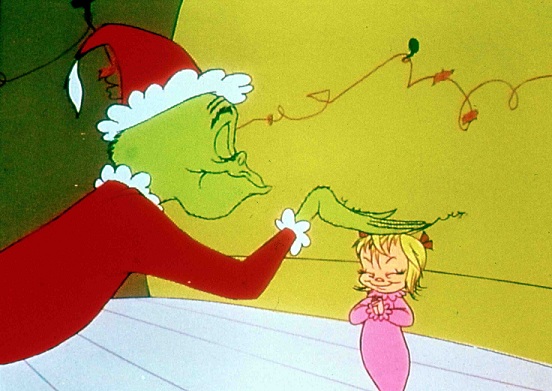
But let’s return to my original query – why would a Christmas special be written by Dr. Seuss, whose most accomplished pre-children’s work was his co-authorship of Design for Death, a 1947 Academy Award-winning documentary about World War II and the occupation of Japan? As a child, however, my reverence for Seuss assured me that I ought to trust him on this one, to enjoy Christmas in spite of my schoolmates’ bemused bafflement at what they considered a devastating personal flaw in me.
I was reminded to not get too annoyed by the constant barrage of carols every time I went to a store, and to remember that Christmas doesn’t have to be about religion – it can be about togetherness and love. And it reminded me that not everyone who had faith was the barbecue bigot down the street.
Today I fully identify as an atheist. And yet every year, my wife and I set up our Christmas tree, deck our halls and watch Christmas special after Christmas special. The Grinch may have tried to steal Christmas, but he gave me a very important gift – an understanding that even though the world isn’t perfect and that there will always be closed-minded people, Christmas should be a celebration of what we have in common, not a magnification of our differences.
Thank goodness I have hands to clasp.
Tomorrow: Spend Christmas Eve with Ebenezer. No, not that one.